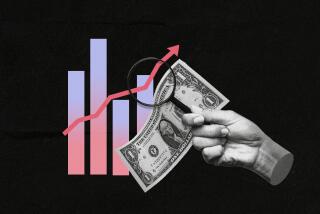U.S. household net worth posts smallest gain of COVID recovery

- Share via
Growth in U.S. household net worth cooled in the third quarter as wealth created by rising home values was eroded by a temporary pullback in the stock market.
Household net worth increased by almost $2.4 trillion, or 1.7%, after a $6.14-trillion jump in the second quarter, a Federal Reserve report showed Thursday. Although the quarterly advance was the smallest of the pandemic recovery, net worth still climbed to a fresh record of nearly $145 trillion.
The third-quarter gain included a $1.4-trillion improvement in real estate held by households, while the value of equity holdings declined by nearly $320 billion.
Although the rise of the Delta variant of the coronavirus curbed spending and briefly dented equity prices during the period, the U.S. economy continued to improve. Solid job growth, robust consumer demand and the biggest company profit margins since the 1950s have driven stocks to new records. Meanwhile, low borrowing costs continue to fuel demand for homes, pushing up prices.
A gold pocket watch said to have been made for J.P. Morgan disappeared, prompting a hunt that plunged into the baroque world of high-end antiquities.
Still, not everyone is benefiting from the surge in stock prices and the housing boom during much of the pandemic. Survey data indicate that just a little more than half of Americans own stock. And for the roughly one-third of households that rent, costs are rapidly rising.
Elevated savings remain a key source of firepower for household spending, though it has eased as federal government stimulus has waned. Net private savings grew at an annualized pace of $2.84 trillion in the third quarter, the slowest growth since the start of 2020.
Nonetheless, wages and salaries grew an annualized $10.5 trillion as employers paid more to attract workers.
Business debt outstanding increased at an annualized rate of $695 billion from the prior quarter, or at a 3.9% pace, in the July-to-September period to a total of nearly $18.2 trillion.
Federal debt outstanding fell at an annualized rate of 1.3% to $24.6 trillion. Government debt has surged over the last two years amid trillions of dollars in federal aid to workers, businesses and local governments during the pandemic.
Consumer credit outstanding not including mortgage debt climbed an annualized $227 billion in the third quarter.
Elite grocery chain Erewhon is embarking on an aggressive expansion in Southern California. Started as a humble bulk grains outlet, its cult success is rewriting the rules of the supermarket business.
More to Read
Inside the business of entertainment
The Wide Shot brings you news, analysis and insights on everything from streaming wars to production — and what it all means for the future.
You may occasionally receive promotional content from the Los Angeles Times.












